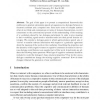255 search results - page 41 / 51 » Dialogization and Implicit Information in an Agent Communica... |
122
Voted
AGENTCL
2003
Springer
15 years 2 months ago
2003
Springer
The goal of this paper is to present a computational framework that enables us to generate elementary speech act sequences in a dialogue between an electronic assistant and a compu...
ATAL
2007
Springer
15 years 3 months ago
2007
Springer
In this paper we develop a novel probabilistic model of computational trust that explicitly deals with correlated multi-dimensional contracts. Our starting point is to consider an...
79
Voted
ATAL
2005
Springer
15 years 3 months ago
2005
Springer
In distributed scenarios the robustness of a reputation mechanism depends on the data available for computation. Especially in ad-hoc networks the amount of available data is rest...
91
Voted
POPL
1990
ACM
15 years 28 days ago
1990
ACM
Abstract. Concurrent constraint programming is a simple but powerful framework for computation based on four basic computational ideas: concurrency (multiple agents are simultaneou...
70
Voted
SIGECOM
2004
ACM
15 years 2 months ago
2004
ACM
The revelation principle is a cornerstone tool in mechanism design. It states that one can restrict attention, without loss in the designer’s objective, to mechanisms in which A...


